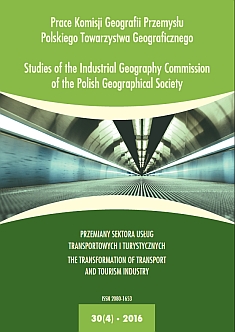Determinants and Perspectives of Service Sector Development in Poland – Intrasector Changes
DOI:
https://doi.org/10.24917/20801653.304.1Keywords:
development, employment, KIBS, services, servicizationAbstract
In the economies of developed countries, services play a key role; they are the largest source of employment growth. Moreover, services determine the efficiency of production processes and some of them serve the purpose of meeting the social needs of population. Due to the progressing inequality of share in the traditional three-sector division of the economy, the intra-industry changes become more important. Thus, the goal of the article is to present the level of service sector development in Poland between 1995 and 2014, with special focus on intra-sectoral employment changes and employment forecast up to 2022. In order to do so, the author had to consider the following areas: 1) determinants of service sector development, 2) KIBS characteristics, 3) the analysis of employment changes in the service sector and KIBS in 1995-2014, 4) the forecast of services sector and KIBS development in Poland.
Downloads
Metrics
References
Bank Danych Lokalnych (2015, 12 listopada). Główny Urząd Statystyczny. Pozyskano z www. stat.gov.pl
Baumol, W.J. (1967). Macroeconomics of Unbalanced Growth: the Anatomy of Urban Crisis. American Economic Review, 57(3), 415–426.
Bettencourt, L.A. i in. (2002). Client Co-Production in Knowledge-Intensive Business Services. California Management Review, 44, 100–128.
Clark, C. (1951), The Conditions of Economic Progress. London: Mac Millan.
Curtis, D.C.A., Murthy, K.S.R. (1998). Economic Growth and Restructuring: a Test of Unbalanced Growth Models 1977–1992. Applied Economics Letters, 5, 777–780.
Eurostat (2015, 17 października). Pozyskano z www.eurostat.eu
Fisher, A. (1939). Production, Primary, Secondary and Tertiary. The Economist Records, 28, 24–28.
Fixler, D.J., Siegel, J. (1999). Outsourcing and Productivity Growth in Services. Structural Change and Economic Dynamics, 10, 177–194.
Fuchs, V.R. (1965). The Growing Importance of the Service Industries. New York and London: National Bureau of Economic Research, Columbia University Press.
Gershuny, J., Miles, I. (1983). The New Service Economy. The Transformation of Employment in Industrial Societies. London: Frances Pinter.
Kuusisto, J., Meyer, M. (2003). Insights into Services and Innovation in the Knowledge-Intensive Economy. Technology Review, 134.
Parinello, S. (2004). The Service Economy Revisited. Structural Change and Economic Dynamics, 15, 381–400.
Rowthorn, R., Wells, J.R. (1987). De-industrialization and Foreign Trade. Cambridge: Cambridge Universitety Press.
Rowthorn, R., Ramaswamy, R. (1997). Deindustrilization – Its Causes and Implications. Economic Issues, 10.
Schnabl, E., Zenker, A. (2013). Statistical Classification of Knowledge-Intensive Business Services (KIBS) with NACE Rev. 2. Karlsruhe: Fraunhofer Institute for Systems and Innovation Research ISI.
Skórska, A. (2009). Development of Service Sector – Implications for Employment in the European Union. W: D. Kopycińska (red.). Labour market in EU and in the world. Economics & Competition Policy, 14, 66–76.
Skórska, A. (2012). Wiedzochłonne usługi biznesowe w Polsce i innych krajach Unii Europejskiej. Katowice: Uniwersytet Ekonomiczny w Katowicach.
Skórska, A. (2013). Uwarunkowania rozwoju sektora usług. W: D. Kotlorz (red.). Serwicyzacja polskiej gospodarki – przemiany wewnątrzsektorowe. Katowice: Uniwersytet Ekonomiczny w Katowicach, 11–53.
Skórska, A. (2014). Praca w gospodarce postindustrialnej – zatrudnienie w sektorze usług w Polsce. W: A. Rączaszek, W. Koczur (red.). Polityka społeczna wobec przemian demograficznych. Studia Ekonomiczne, 167, 249–258.
Summers, R. (1985). Services in the International Economy. W: R.P. Inman (red.). Managing the Service Economy. Cambridge: Cambridge Universitety Press, 27–48.
System prognozowania popytu na pracę (2015, 12 listopada). Pozyskano z www.prognozowa- niezatrudnienia.pl
Warnock, V.C., Duncan, D.G. (2004). Jobs In a Changing American Economy. Mortgage Banking June.
Wood, P. (2002). Knowledge-Intensive Services and Urban Innovativeness. Urban Studies, 39, 993–1002.
Downloads
Published
How to Cite
Issue
Section
License
Articles are published under the terms of the Creative Commons License (CC BY-ND 4.0; Attribution– NoDerivs).

